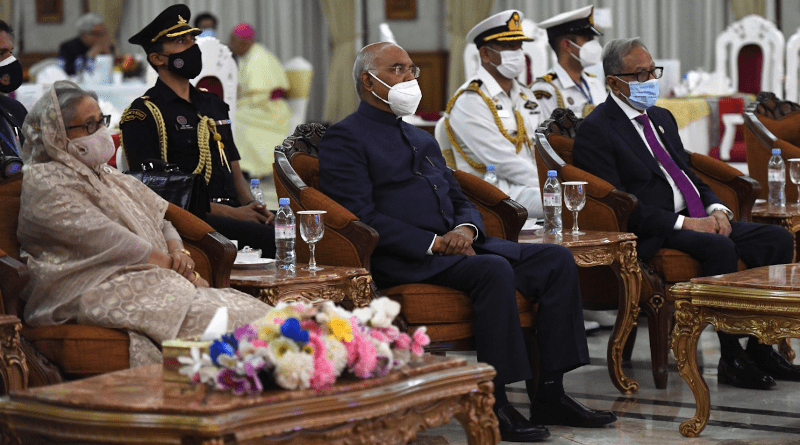Elevating Bangladesh-India Partnership – OpEd
On December 6, 2021, for the first time in history, Bangladesh and India celebrated the Maitree Diwas to foster the bilateral ties. A day after the Maitri Diwas celebrations, the visit of Indian Foreign Secretary, Harsh Vardhan Shringla from December 7 to 8, 2021 and the State visit of the Indian President, Ram Nath Kovind to Bangladesh from December 15 to 17, 2021 underscores the growing importance of the bilateral partnership. In fact, the nature and scope of Bangladesh-India relations has touched upon every aspects of human life. Thus, one can argue that the friendship between Bangladesh and India should not be confined to the high-level bilateral visits or celebrating special days only as the nature and scope of the ties impact the everyday lives of the people of these two countries immensely. Against this backdrop, this write-up recommends strengthening Bangladesh-India relations based on shared prosperity and responsibility.
Bangladesh and India needs to elevate their ties for the following factors. First, Bangladesh and India are both continental and maritime neighbors. And neighbors can play crucial role in the context of economy, security, trade and development. We have seen that when European neighbors started cooperating each other averting war and conflicts, the fruits of cooperation benefitted tens of thousands of people. Thus, fostering cooperation between and among neighbors matter. One should also note the centuries old cultural and civilizational linkages between India and East Bengal and later Bangladesh which should also matter to foster Bangladesh-India ties.
Second, both Bangladesh and India are rising economic powers. Their socio-economic development and prosperity benefits each other. Notably, India receives the highest number of tourists and medical patients from Bangladesh where a strong political economy is involved.
Third, in the context of maritime domain, the Bay of Bengal and the Indian Ocean Region has become the center of competition among the regional and extra-regional powers. In order to address the growing non-traditional security challenges, including climate change, piracy and IUU fishing, cooperation among the littoral states in the Bay of Bengal and Indian Ocean region becomes necessary.
Fourth, the whole world is looking at blue economy. And in the pursuit of blue economy potentials, Bangladesh and India needs to promote cooperation in the areas of science and technology, maritime education and research, investments and innovations both at bilateral and regional scale.
Fifth, in this pandemic world, cooperation is the only key. Both India and Bangladesh can play leading role in the promotion of global vaccine cooperation, technology and science cooperation, and agricultural cooperation.
Sixth, Bangladesh is facing serious challenges due to the huge influx of Rohingya refugees in the country. It becomes a daunting task for Bangladesh to continue its humanitarian support for more than 1.1 million Rohingya refugees. In addition, there is huge possibility of spreading violence from these Rohingya refugees as the scholarly study found that when the refugees stay longer time in camps, there is more possibility of spreading conflicts and violence from them. There are already several violent incidents at the camp and outside the camp that strongly supports the claim. So, one cannot deny that there is a clear regional security implications of Rohingya crisis where India can also be affected. In addition, one can also argue the role of the Rohingyas in the facilitation of drugs smuggling particularly yaba, human trafficking in Bangladesh and India. This spread of drugs smuggling can deteriorate our society, young generations of both India and Bangladesh. Thus, there is no scope to identify Rohingya crisis only Bangladesh’s problem. Against such a backdrop, as a regional power and close friend of Bangladesh, India needs to take proactive role in resolving the Rohingya crisis both at bilateral level with Myanmar, at the regional and global scale.
Finally, in the post COVID-19 world politics, Bangladesh and India needs to cooperate on the issues of mutual and regional concern. The issue of trade negotiations, climate negotiations, UN peacekeeping missions impact people of these countries and beyond. Thus, Bangladesh and India needs to play a constructive and cooperative role in global diplomacy for a better, fairer, and humane world.
The bottom-line is that 21st century Bangladesh-India partnership needs to be promoted based on shared peace, progress and prosperity that impact tens of thousands of people across borders and beyond. At the bilateral scale, India should not take any policy that negatively impacts the bilateral ties. One can mention about the NRC issue. In addition, India should also resolve the long-standing water sharing issue. Similarly, in global diplomacy, shared responsibility for a sustainable planet should guide Bangladesh-India partnership.
*The writer is research fellow at the Center for Bangladesh and Global Affairs (CBGA, Dhaka, Bangladesh). He is also an Assistant Professor of International Relations at the University of Rajshahi. E-mail: [email protected]

